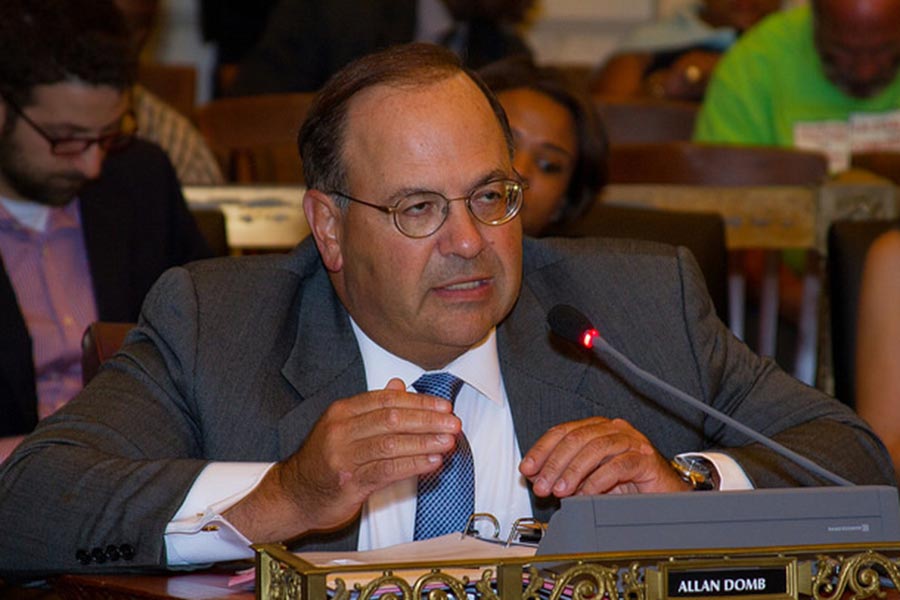Allan Domb Floats Idea to Reduce Philly’s Property Tax Abatement
The councilman says his plan to effectively reduce the tax break to 8.5 years would raise more money for affordable housing than a recently proposed tax on new construction.
Looking for ways to bolster the resources of Philadelphia’s Housing Trust Fund, which supports affordable housing efforts in the city, City Council is currently moving legislation to impose a 1 percent tax on new construction. But Councilman Allan Domb, who voted against the bill in committee, thinks we can (and should) do better than creating a new tax.
At last week’s meeting of Council’s Committee on Finance, Domb proposed an alternative to the highly contested construction impact tax: an adjustment to Philly’s 10-year property tax abatement that would effectively make the life of the abatement 8.5 years, for a 15 percent reduction. According to Domb, the proposed construction tax would generate an estimated $15 million in annual revenue (the bill’s supporters say that figure is closer to $19 million) while altering the property tax abatement to 9.4 years, for a 6 percent reduction. The difference, says the councilman, is that his plan would provide more than double the amount of revenue.
“It’s our suggestion that if we take the 10-year tax abatement and leave it alone for the first seven years — keep it at 100 percent — [then] in the eighth year we make it a 75 percent benefit, in the ninth year make it a 50 percent benefit, and in the tenth year a 25 percent benefit, it would serve many purposes,” Domb tells Philly Mag. “One, it helps homeowners ease into their payments as the abatement begins to unwind over the course of the final three years. Two, instead of 10 years, mathematically my alternative would make the tax abatement 8.5 years. And keeping in mind that the construction tax makes the abatement 9.4 years, we’re going to get two-and-a-half times more money than the construction tax would generate.”
Domb says the beauty of his idea is that the Department of Revenue wouldn’t have to develop an entity to monitor and collect the new tax at an additional cost to the city. The councilman believes that his course of action would prove far easier to secure the money needed in a much “cleaner and simpler” way. If ultimately successful, Domb says he is open to revisiting his alternative in the future to make another gradual reduction to the property tax abatement.
“Let me be clear: I am in full support of funding the Housing Trust Fund and the other programs that help our residents who have real needs and require assistance,” Domb says. “Added resources would support them and have a mutually beneficial impact on our city. I just believe we can avoid the method of taxation and do it another way.”
As for funneling that money to the Housing Trust Fund, why wait? Domb says City Council could just build the funding into its budget immediately with the anticipation of increased revenue from adjusting the abatement. “I would like to see Council consider this alternative, pragmatic approach,” he says. “I am concerned a new tax could be a setback for Philadelphia’s economy in the short and long term.”
The councilman says he feels that his peers will back him on this proposal, although that support remains to be seen. A spokesperson for Council President Darrell Clarke made it clear that he is not in favor of adjusting the abatement at this time, citing the fact that any bill introduced by Domb on this front would have to come during the next legislative session — meaning that, if passed, it would not go into effect until January 2020 at the earliest. And Councilwoman Jannie Blackwell, chair of the finance committee, told Philly Mag that she believes we need to take a look at the abatement alternative, although the construction tax is likely to pass regardless.
“It sounds easy, but I don’t think it’s that easy,” Blackwell said of the proposal. “I’m for poor people and poor neighborhoods getting this abatement. I think we have to look at this carefully and up front before we make any blanket statements. I’m for us trying to lure developers into working in more bad areas.”
At the very least, it would appear that Domb has Philly union boss John “Johnny Doc” Dougherty in his corner. Dougherty penned a letter to City Council in which he stated his reasoning for opposing the construction tax, adding “We are not big fans of the 10-year tax abatement on new construction and are open to radically altering or eliminating it all together.”
Building Trades Letter to City Council.original by PhiladelphiaMagazine on Scribd



